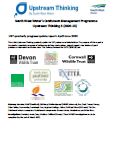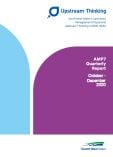The Project
South West Water in collaboration with a group of regional conservation organisations, including the Westcountry Rivers Trust, the county Wildlife Trusts for Devon and Cornwall and Exmoor National Park Authority, have established one of the largest and most innovative conservation projects in the UK for catchment management: ‘Upstream Thinking ’ which is delivered as a Partnership. This has been in operation since 2010 following earlier trials and monitoring which helped to demonstrate results and benefits to take this forward in key areas.
Much of our drinking water in the Westcountry is sourced directly from surface waters; that is our rivers, streams and reservoirs. Upstrem Thinking aims to ensure potential sources of pollution are prevented from entering these surface waters, thus reducing the ongoing level of treatment and associated chemicals and energy, to meet our supply needs and standards. By proactively advising and influencing decisions leading to improvements on the ground, this helps keep costs down for the longer term whilst securing safe supplies.
Water quality issues in Westcountry rivers usually derive from thousands of small sources or incidents across a wide area, which may not individually present a problem, however collectively mean our rivers are not achieving good standards. By reducing inputs into our rivers, we will not only improve raw water quality entering the treatment works, but also help bring about additional benefits relating to the general health of the river and its ecology, and to agricultural productivity in the region. Over the current 5-year period, we will be working with landowners across 10 strategically important drinking water supply river catchments in the Westcountry: the Fowey, Tamar, Exe, Dart and Otter.
Through Upstream Thinking, the UST partners continue to deliver positive change on the ground by working closely with land owners, building relationships through a consistent and confidential presence, listening as well as advising on water friendly practices. By working with farmers we gain an understanding of their future plans as well as current operations, each visit tailored to individual circumstances so that the best options are considered for economic as well as environmental reasons. We understand that farming is a business and requires sound advice, solid evidence and a qualified, knowledgeable team.
Each farm receives a detailed and individually tailored farm plan, which outlines opportunities for change, which may take a fresh look at the protection of land and water; soil, nutrient and pesticide management. We provide capital grants to support the delivery of a broad range of interventions to foster change, from watercourse fencing to manure stores, these greatly reduce the risk of pollutants entering our rivers by directly intercepting the pathways of nutrients or sediment. Good soil husbandry and protection of this valuable resource is also fundamental to water quality protection; UST offers soil testing to understand and plan nutrient application, detailing steps to reduce risk of erosion and mobilisation, recognising compaction.
UST also run a pesticide amnesty, providing farmers with a free, confidential way of disposing of banned and out of date pesticides in our target areas. Old and obsolete products stacked away in the back of a shed can degrade and leak over time, seeping into the ground and ultimately entering the water system. So far, we have removed nearly a tonne of chemicals as we approach the midpoint of this round – totally eliminating any risk to the environment from these products.
You can read more about our progress in our quarterly reports.
 |
 |
 |
| Upstream Thinking Quarter 1 report | Upstream Thinking Quarter 2 report | Upstream Thinking Quarter 3 report |
